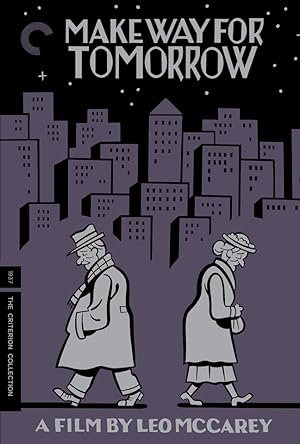Because I loved Love Is Strange, which one critic suggested was an unofficial remake of Make Way for Tomorrow, I decided to watch the original. I usually prefer classics, especially from the golden era of Hollywood black & white movies, but I did not prefer Make Way for Tomorrow over Love Is Strange.
From the opening scene until the end, I was annoyed at the elderly couple. Unlike the couple in Love Is Strange, the couple in Make Way for Tomorrow were intentionally careless with the one thing that they had power over, information, and when they were called out for chronically springing messy information on their adult children after it was too late to prevent a problem, they used guilt and passive aggressive techniques to deflect any understandable anger. Certainly their family’s responses ranged from far from ideal, but human to monstrous, but perhaps if one considers who raised them, their responses are understandable. The father acts like a jerk to a doctor trying to help him and lands everyone in this mess by waiting too late to give his kids the information that they need to devise a better solution. The mother jeopardizes a stream of her son and daughter in law’s income by ignoring their diplomatic pleas and the granddaughter’s reputation by keeping what was then considered a scandalous secret.
Make Way for Tomorrow is unflinchingly brutal in its ending, which has garnered the classic much praise, but it was created before Social Security or Medicare existed. Make Way for Tomorrow works better as a political movie-an argument that the state is the only thing that can provide a safety net for our most vulnerable, the elderly, because the elderly no longer have the capacity to make rational decisions or face reality; their children are either not capable of facing the burden of caring for the elderly and raising their children and/or those who are capable may not be willing to. “What therefore God has joined together, let not man put asunder.”-Matthew 19:3
If there is one way that Make Way for Tomorrow clearly shows that the elderly couple is superior to their children, it is in their relationships with people who are not similar to them demographically. Make Way for Tomorrow has one black female character, an employee whom the son and daughter-in-law are always trying to get to work later to keep the mother occupied, but it is unclear whether she is compensated. She clearly wants to get out of there. Did audiences read her as stereotypically lazy and noisy (she eavesdrops) or exploited? I have no idea, but what is clear is that she feels abashed at the mother’s parting handmade present and kind words regarding their relationship.
Make Way for Tomorrow also has a Jewish immigrant storekeeper, who is possibly the best character in the entire movie and the father’s only friend. When he visits the father, the daughter is rude, perhaps anti-Semitic, but to be fair, she is surly to everyone except the aforementioned doctor. He lives simply, full and well with all and by treating him poorly, it reflects poorly on her, not the storekeeper.
It took me two sittings to watch Make Way for Tomorrow. I don’t think that I need to see a financial horror movie when there are so many real life examples.
Stay In The Know
Join my mailing list to get updates about recent reviews, upcoming speaking engagements, and film news.




